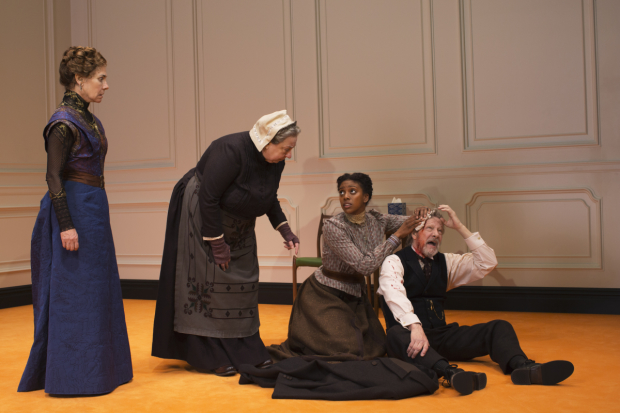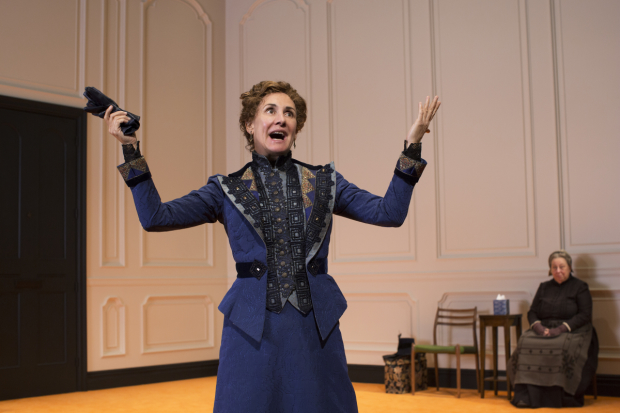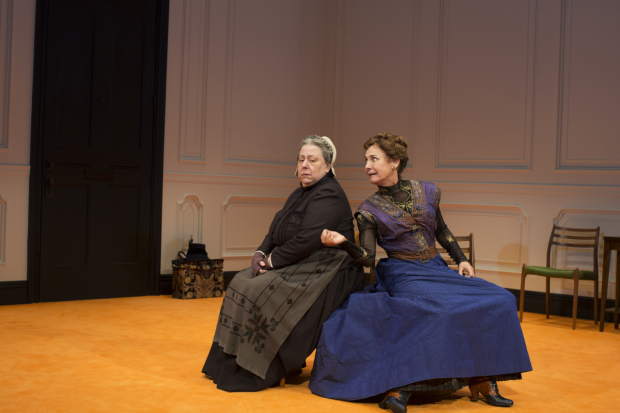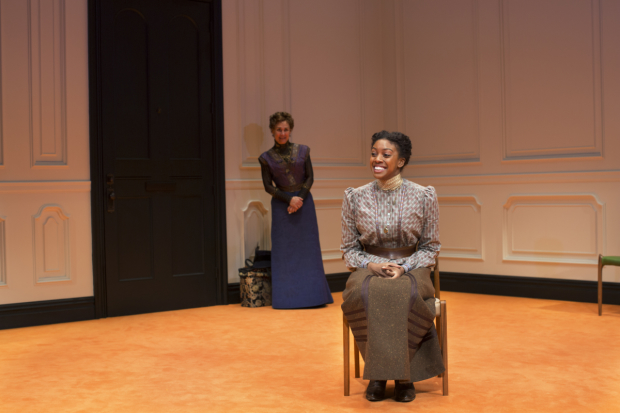A Doll's House, Part 2

(© Brigitte Lacombe)
An imposingly large blue door dominates the stage of the John Golden Theatre, where playwright Lucas Hnath is making his Broadway debut with A Doll's House, Part 2. The door is almost too big, as if it were made for giants. It is an apt metaphor for the towering source material for this audacious sequel. Hnath takes a massive risk in amending an essential drama of the Western theater. It is a leap that pays off in delightful and often hilarious ways.
Part 2 assumes that its audience has a rudimentary knowledge of Henrik Ibsen's A Doll's House, that game-changing play in which a resourceful housewife leaves her patronizing husband and their children behind, departing with the famous door slam heard round the world (certainly the door on this stage is big enough for that to be true). Hnath imagines what happens when Nora (the indomitable Laurie Metcalf) returns through that very threshold 15 years later.

(© Brigitte Lacombe)
No, she's not crawling back to domestic life. Rather, she has recently discovered that Torvald (an emotionally calloused Chris Cooper) never actually filed for divorce. This has the potential to ruin her reputation as a leading feminist and anti-marriage activist (Nora has become a successful author since she left Torvald). The law being what it is (unequal), her business partners could nullify her contracts, which were signed without the consent of her husband. Making matters more urgent, an angry man whose wife left him after reading one of Nora's books is threatening to expose her as a hypocrite and fraud. She has come back to make sure Torvald signs the divorce papers so she can move on with her life.
While she waits for Torvald to return home, she regales family nanny Anne Marie (Jayne Houdyshell) with her newfound clarity about the cruel futility of marriage. Wearing a power frock (telling costumes by David Zinn) she goes into a spiel that sounds like it has been refined in thousands of hotel conference rooms. Metcalf radiates the confidence of a self-made woman, the best-selling author who triumphed against the odds in a man's world. She later turns her pitying gaze (and boy, does Metcalf have one) to Anne Marie and suggests that her modest life of raising others people's children is entirely her choice. We half expect her to ask the nanny to "lean in."

(© Brigitte Lacombe)
"F*ck you, Nora," Anne Marie responds, causing the audience to cheer wildly. Part of our exuberance is for the magnificent Jayne Houdyshell, who endows the long-suffering nanny with a no-nonsense attitude that makes us root for her. Like Metcalf, she is also incredibly funny. Nora is full of righteous indignation about the unfair treatment of her sex, but she is willfully ignorant of how economics have painted Anne Marie into an even more difficult corner.
By exposing the casual class assumptions of the original (in which the children remain mostly out of sight, under the care of Anne Marie) Hnath raises deeper questions not just about a certain brand of feminism, but the cult of individualism that is so engrained in modern society. Is the ability to follow your heart actually the greatest privilege of all? Hnath has explored similar territory in his plays Red Speedo (about a doping athlete) and A Public Reading of an Unproduced Screenplay About the Death of Walt Disney (concerning that most prolific merchant of dreams). A Doll's House, Part 2 surpasses those earlier efforts in its sheer clarity and brutality: Often, determination just isn't enough to change the world. For most of us, it isn't even enough to change our little lives.
Hnath also belies the linear narrative of social progress through the character of Nora's reactionary daughter, Emmy (a brilliant Condola Rashad). Rashad portrays her as a passive-aggressive millennial with a delicate voice and a permasmile. Seeing Nora's visible distaste when she talks about her desire to marry, Emmy responds with acid politeness: "I can see you cringe when I say what I'm saying. But that's about you, and it's not about me." She never raises her dainty voice above a respectable indoor level, even as her words drip with venom.

(© Brigitte Lacombe)
Director Sam Gold has led everyone in this cast to thoughtful and revelatory performances in an appealingly clean production. The simplicity of Miriam Buether's set ensures that nothing distracts us from the actors and the words they are saying. We are very thankful that Gold has abandoned his recent flirtation with non-traditional lighting: Jennifer Tipton has turned Buether's set into a box of light. When the acting is this good, we are thankful to be able to see the performers' faces. This is theatrical austerity done right.
You may want to give the original a read before you go to Part 2 (and you really should go). While not strictly necessary, it deepens the experience of the play. Hnath refracts Ibsen through the prism of contemporary life, revealing the complicated spectrum of issues that always existed within a drama that hit the Western world like an intense ray of light. Whether you are a proponent of intersectional third-wave feminism, a die-hard disciple of Gloria Steinem, or a proud reactionary to it all, it will be hard to walk away from A Doll's House, Part 2 claiming that you have all the answers.










